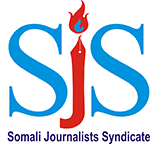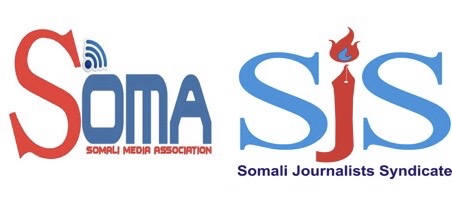MOGADISHU, Somalia, 26 August 2020 – Somali Journalists Syndicate (SJS) and the Somali Media Association (SOMA) strongly protest against the oppressive and draconian Media Law (amendment) which was signed into law by President Mohamed Abdullahi Farmajo and followed by an announcement to officiate its enactment by the Ministry of Information on Wednesday 26 August and warn that the amended media law will have chilling effect on both the Somali Media houses and the journalists.
The amended version of the media law remains the same as the previous media law, which was signed into law in 2016, and the legal comments submitted by Somali Journalists Syndicate (SJS), Somali Media Association (SOMA) and other media associations were not incorporated, giving the government a pretext to crackdown critical media and journalists.
Having reviewed the new media bill, SJS and SOMA:
- Are dismayed by the requirements of accreditation and registration of journalists into a government database under the Ministry of Information and yet-to-be-formed Somali Press Council, a stipulated in Article 18 of this law. SJS and SOMA are calling that registration of journalists should be a self-regulatory.
- oppose any type of justification for censorship to be imposed on the media on a condition that a media house is deemed to be breaching laws including the Media Law itself, according to Article 3 (Clause 3). The Media Law should forbid any type of prior censorship unconditionally and guarantee the right to freedom of information as enshrined in Article 18 and 32 of the Provisional Federal Constitution (2012). The right to freedom of expression is also protected by Article 19 of the Universal Declaration of Human Rights (UDHR) which Somalia is a signatory and in the Article 9 of the African Charter on Human and People’s Rights (ACHPR).
- Reject the restrictions of media coverage under the pretext of vaguely worded provisions as per Article 4 of this Law which cites “spreading false news”, “inciting violence or promoting tribalism” or “spreading unfounded propaganda” and “disseminating any news that contains hate or extremism”.
- Are concerned by the imposition of a monetary fine (that will be issued in the form of a special regulation) on journalists, editors, media managers for breaching the media law or breaking government-owned Press Council’s “code of ethics”. Worrisome is that this Law gives the Attorney General the powers to prosecute journalists, editors and media managers over “payment of fines”.
- Are disturbed by the extra powers given to the Ministry of information for it to have a firm control on Somali Press Council. The Somali Press Council should be independent from government interference at all.
The requirement for the media owners to declare amount of money to be invested on the media house, its source of income/funds, private addresses and identity of managers as prerequisites for applying registration, according to Article 11, is unacceptable. We also refuse the imposition of advance deposit of unspecified amount of money for any new media house before seeking license, as described in the Article 9.
Journalism is not a crime and therefore any provision that criminalizes the free flow of information and the perceived critical reporting, particularly Article 29 which suggests imposing draconian penalties for “dissemination or publication of false information”, “incitement” or “spreading propaganda against the dignity of any citizen, individual, institution or the state” must be reviewed. The same Article violates the protection of journalistic sources as one of the key rights journalists have in order to exercise their freedom of expression and to execute their duties as a ‘’public watchdog”. We call the removal for this article.


